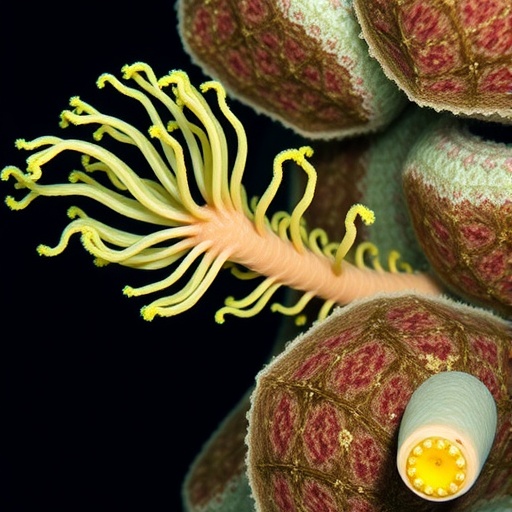In the depths of our oceans lies an ancient lineage of life whose influence on Earth’s nutrient cycles is only beginning to be understood. Marine sponges, among the earliest multicellular animals to have emerged on the planet, are at the center of a groundbreaking research initiative led by Dr. Tanja Stratmann. Her project, “Nitrogen Cycling in Modern Sponges with Clues About Their Role in Past Oceans,” aims to explore the complex biogeochemical processes underpinning nitrogen transformation within these primordial organisms and their enduring ecological roles.
Sponges, often seen as simple filter feeders inhabiting a wide range of aquatic environments from shallow coastal canals to the abyssal depths, have a surprisingly sophisticated relationship with nitrogen. Nitrogen, an essential element for life, moves through ecosystems in various chemical forms. Understanding how sponges process nitrogen involves tracking stable isotopes of this element, but previous studies have only scratched the surface. Notably, the nitrogen isotope profiles of glass sponges—Hexactinellida—reveal unexpected patterns that challenge earlier assumptions about their feeding ecology and biochemical interactions with their surroundings.
Large sponge biomasses in certain marine regions can profoundly modulate local biogeochemical cycles, particularly nitrogen availability. These ancient animals establish symbiotic communities with diverse microorganisms capable of mediating critical nitrogen transformations, such as nitrification, denitrification, and nitrogen fixation. Dr. Stratmann’s work leverages advanced methodologies, including the deployment of incubation chambers in situ at extreme depths of around 4,000 meters, to quantify these microbial-mediated nitrogen fluxes within sponge microhabitats. Such deep-sea investigations are logistically challenging but essential, as traditional surface-based observations cannot capture the authentic metabolic dynamics of glass sponges.
Prior expeditions off New Zealand and in the Central Pacific have laid the groundwork for such studies, enabling direct measurement of nitrogen cycling in natural deep-sea sponge communities. The incubation chambers isolate individual sponges and their surrounding water, allowing precise monitoring of chemical exchanges over several days. These data elucidate the metabolic rates and pathways by which sponges and their symbionts transform various nitrogen species, offering unprecedented insight into their ecological functions and contributions to marine nitrogen budgets.
Yet, Dr. Stratmann’s research transcends contemporary ecosystems. She pioneers an innovative approach to investigating nitrogen cycling in fossilized sponges, analyzing nitrogen-containing organic compounds preserved in ancient skeletal structures. By extracting these molecular remnants and determining their isotopic signatures, her team can reconstruct nitrogen metabolic pathways from bygone geological epochs. This palaeobiogeochemical perspective holds the key to unravelling historical oceanic nutrient dynamics and environmental conditions that shaped marine ecosystems over hundreds of millions of years.
Decoding nitrogen cycling in fossil sponges not only informs about the organisms themselves but also generates proxies for past marine environmental variables such as oxygenation levels, nutrient availability, and microbial activity. These insights are critical in piecing together Earth’s climatic and biogeochemical evolution. Dr. Stratmann collaborates with natural history museums across Europe, tapping into their extensive sponge collections to extend her temporal reach and establish a robust dataset spanning diverse geological periods.
Returning to her alma mater, the University of Bremen, Dr. Stratmann is supported by MARUM – the Center for Marine Environmental Sciences – which provides cutting-edge facilities indispensable for executing her multidisciplinary research. MARUM’s capabilities in biogeochemical analyses and oceanographic instrumentation uniquely position her group to address complex questions at the intersection of marine biology, chemistry, and earth sciences. Beginning in February 2026, she will lead her project from Bremen, fostering collaborations and continuing deep-sea research missions.
The significance of this work extends beyond academic curiosity. Sponges represent key benthic organisms that shape ecosystem functioning and influence global biogeochemical cycles, including those regulating greenhouse gases and nutrient fluxes. Understanding their nitrogen metabolism is vital, especially as benthic habitats face mounting threats from climate change, ocean acidification, and human exploitation. Insights gained here will contribute to predictive models of marine ecosystem responses under future environmental scenarios.
Dr. Stratmann’s project was recently awarded the prestigious ERC Starting Grant, a highly competitive funding scheme recognizing exceptional early-career researchers. This grant facilitates three to five years of independent research, supporting high-risk, high-reward scientific inquiries that push boundaries. Among nearly 4,000 applicants across Europe, her selection underscores the innovative scope and potential impact of her investigations into ancient and modern marine nitrogen cycling.
The commitment of researchers like Dr. Stratmann reflects a broader scientific effort to decode the complex interplay of biological, chemical, and geological processes that govern life on Earth. By bridging observational studies in contemporary marine environments with palaeontological analyses, this research promises to deepen our understanding of the evolutionary history of nitrogen cycling and its implications for marine ecology throughout time.
Moreover, the collaborative ethos embodied by MARUM and its researchers exemplifies the integration of fundamental research with societal responsibility. The center’s dedication to open data, sustainability, and dialogue bridges the gap between science and public engagement, ensuring that discoveries in marine environmental sciences translate into actionable knowledge for environmental stewardship.
In conclusion, the exploration of nitrogen cycling in both living sponges and their fossil relatives offers a novel window into the intricate biochemical networks underlying Earth’s marine ecosystems. Dr. Stratmann’s multifaceted approach combining deep-sea fieldwork, stable isotope analyses, and palaeobiochemistry heralds a new era of marine biogeochemical research. These studies have the potential to reshape our conception of early animal evolution, terrestrial nutrient cycles, and the resilience of oceanic life through global environmental shifts.
Subject of Research: Nitrogen cycling in modern and fossil sponges and their ecological and paleoenvironmental significance.
Article Title: Ancient Sponges Reveal Secrets of Nitrogen Cycling in Past and Present Oceans
News Publication Date: Information not provided.
Image Credits: Photo: MARUM – Center for Marine Environmental Sciences, University of Bremen
Keywords: Biochemistry, Cell Biology, Ecology, Physical Sciences, Earth Sciences, Earth Systems Science, Oceanography, Ocean Chemistry, Marine Geology, Marine Ecology, Marine Biology




